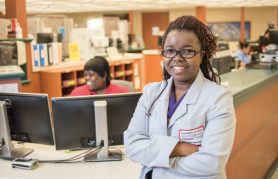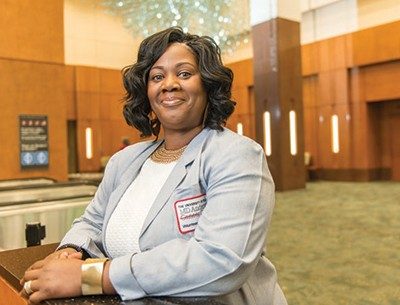Some of MD Anderson’s own spend their free time giving back
Current staff members and two retirees talk about the fulfillment they find in volunteering

Eunice Murage
photo by Wyatt McSpadden
Each weekend Eunice Murage exchanges her white lab coat for a light-blue MD Anderson volunteer jacket.
Murage is a research scientist and belongs to a select group whose members work and volunteer at the cancer center. During the week she’s in the lab, studying ways to detect cancer early. On weekends, she’s visiting patients in their rooms, making their days a little brighter.
Current and retired MD Anderson employees who volunteer are highly valued for the time and energy they devote to helping others. All have their own reasons for wanting to help.

Ericsteven Abordaje
In college, Ericsteven Abordaje and his girlfriend studied hard but still had spare time. They decided to use it helping others. Together, they applied and were accepted to MD Anderson’s volunteer program.
Abordaje was assigned to the Children’s Hospital, where he helps in many ways.
On Fridays, he accompanies Child Life Specialists to patients’ rooms for “bedside play.”
“If I child is too tired or sick to visit the hospital’s playroom, we bring the playroom to them,” he says.
On Friday evenings, he transforms the playroom into a theater and serves pizza and popcorn while children enjoy movie night.
And three Saturdays a month, he’s a pediatric liaison – a “jack of all trades.” He does whatever’s needed, including visiting with patients and their families, delivering supplies and supervising pet-therapy visits.
“I help patients associate their hospital experience with fun memories – not scary or unpleasant ones.”
Abordage has now graduated from college and works at MD Anderson as a patient transportation trainer.
He still volunteers at the Children’s Cancer Hospital, and is studying to become a child life specialist.
“Volunteering has shown me how meaningful it is to make a lasting and positive impression in the lives of children and their families,” he says.

Maxine Hill
A breast cancer diagnosis in 2010 led Maxine Hill to volunteer.
“During my six months of chemotherapy, radiation and surgery, volunteers checked on me, brought me warm blankets, and made sure I had everything I needed,” she says. “I knew how much the volunteers helped me through my cancer journey, and I wanted to do the same for others.”
Hill retired from MD Anderson in 2014 after 30 years of service in Accounts Payable and Grants and Contracts. Since then, she’s volunteered at the MD Anderson Pavilion information desk, helping patients find their way to appointments and anywhere else they need to go.
“It’s so rewarding to help others who are going through a difficult time,” says Hill.
“Sometimes just a smile or a ‘hello’ makes patients feel better.”
Today, Hill is cancer free and enjoying life. She enjoys traveling with her daughter, who plans destination weddings, and spending time with her new granddaughter.
Eunice Murage
As a senior research scientist at MD Anderson, Eunice Murage, Ph.D., looks for chemical markers in the body that signal the early onset of cancer.
“I’ve always been curious and like to solve mysteries,” she says.
When she’s not working in the lab at MD Anderson’s McCombs Institute for the Early Detection and Treatment of Cancer, Murage volunteers as a patient advocate. Every Saturday she visits hospitalized patients and educates them about the MD Anderson resources designed to make their stay easier.
“I tell them and their families about all our amenities, like dining services, gift shops and the onsite beauty shop, library and post office,” she says.
And because she’s a tireless advocate for science, Murage always adds a plug for MD Anderson’s behind-the-scenes research that may someday help cure and prevent cancer.
“Patients see their doctors and nurses every day,” she says. “I remind them that scientists play an important role, too.”

Isaac Rosen
During his career as a medical physicist, Isaac Rosen, Ph.D., saw firsthand how difficult cancer treatment can be, not only for patients but for their families as well.
“Being treated in an institution as large as MD Anderson can be especially overwhelming, so I decided I wanted to help make a difficult time less confusing for patients and their families,” says Rosen, a retired professor of Radiation Physics who now holds the title Professor Emeritus.
As a volunteer in the outpatient surgery waiting area, he keeps families informed while they wait for their loved ones to come out of surgery.
Once an operation is finished, he escorts family members to the recovery area where they’re reunited with their relatives.
Rosen chose to volunteer in the waiting area because he wanted to interact directly with families.
“They respond so warmly and are grateful for the help and attention volunteers provide,” he says. “I always tell them that MD Anderson is a great institution, the best place in the United States to be treated for cancer, and I am enormously proud to be associated with it.”












